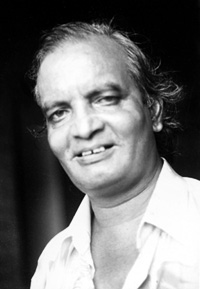Sofa, Ahmed

Sofa, Ahmed (1943-2001) writer and critic. Ahmed Sofa articulated dissenting views, progressive man of letters, and an organiser, was born in a middle-class family in Gachhbaria village under Chandanaish upazila in chittagong on 30 June 1943. After receiving his secondary and higher secondary education in Chittagong, he studied at the University of Dhaka. Although he never paid much stress on formal education, he received his MA degree in political science and later did research work for a PhD; but he was not able to earn the degree. An autodidact and a confirmed bachelor, Sofa was an free thinker.
Sofa was a very intelligent and original writer. He started writing creativity in the 1960’s and left his mark through in his stories, novels, poems, essays, critical works, translations, juvenile literature, and composition in other such areas. He had also edited many literary magazines. He is considered a successful writer of fiction and used his own personal experience as the basis of his stories and novels. He tried to portray the desire and hopes of people and their need for salvation and independence.
He also protested against social injustice through his writing. The novels he wrote are Surya Tumi Sathi (Sun, you are my companion, 1967), Uddhar (Rescue, 1975), Ekjan Ali Kenaner Utthan Patan (The rise and fall of one Ali Kenan, 1989), Alatachakra (A circle of fire, 1990), Obkar (The chest-note, 1993), Gabhibrttanta (Accounts of cows, 1994), Ardhek Nari Ardhek Ishvari (Half woman and half goddess, 1996) and Puspabrksa O Bihabgapurana (Flower tree and the accounts of birds, 1996). His volume of stories is titled Nihata Naksatra (Murdered star, 1969).
He had a distinctive poetic style. His collections of poems include Jallad Samay (Time, the executioner), Ekti Prabin Bater Kachhe Prarthana (A prayer to an old banyan tree), Lenin Ghumobe Ebar (Lenin will now sleep) etc. He leavened his poetical style with his feelings, use of dialect and figures from legends, etc. He also translated Faust by Goethe and the agnostic writings of Bertrand Russell, but he is chiefly noted for his scholarship as an essayist.
Sofa's research focussed on the society of Bengali Muslims, its awakening, formative period, development, intellectual progress etc. Inspired by Bangali nationalism in the 1960's, he like many others started to trace the origins of its self. His reflections on such matters are expressed in two of his books-Buddhibrttir Natun Binyas (New exercise of intellect, 1973) and Babgali Musalmaner Man (The Mind of the Bengali Muslims, 1976). These two works, along with his other essays on the nation, society and politics, earned him fame as an intellectual. His exploration of social, political or cultural history led to the book called Sipahi Yuddher Itihas (History of the Sepoy movement); his Yadyapi Amar Guru (He is still my teacher) traces the interaction between different sages and society. He also wrote on politics and Bankimchandra. He regularly contributed columns to many newspapers and periodicals, towards the end of his life, he wrote some essays critiquing the society, culture and politics of the country.
Ahmed Sofa was against opportunism. He was a champion of idealism and progressive culture. A good organiser, Sofa played an important role in mobilising writers along with ahmed sharif to established the bangladesh lekhak shibir (Bangladesh writers' camp) in the nineteen seventies. He always wanted the young to rise to the occasion. He always endeavoured to inspire people to participate in progressive humanitarian causes. He died of cardiac arrest on 28 July 2001. [Ahmad Kabir]
